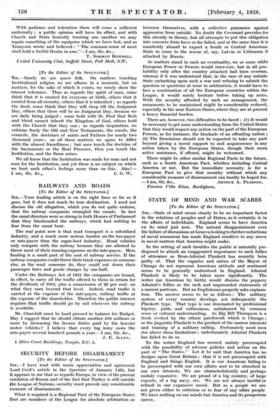RAILWAYS AND ROADS
[To the Editor of the SPECTATOR.] Snt,—Your leading article is on the right lines so far as it goes, but it does not reach its true destination. I need not discuss the old allegation, which you do not quite endorse, that the railway companies strangled the canals. In fact the canal directors were so strong in both Houses of Parliament that they blackmailed the railways, which had nothing to fear from the canal boat.
The real point now is that road transport is a subsidized industry, and a much more serious burden on the tax-payer or rate-payer than the sugar-beet industry. Road vehicles only compete with the railway because they are allowed to throw most of their running expenses on the rate-payer. Mere hauling is a small part of the cost of railway service. If the railway companies could throw their track expenses on someone else, as the road concerns do, they could cut down their passenger fares and goods charges by one-half.
Under the Railways Act of 1921 the companies are bound, in effect, to carry all the traffic offered to them in return for the dividends of 1913, plus a commission of 20 per cent. on whit they earn beyond that level. Indeed, road traffic is carried at the expense of the rate-payer, railway traffic at the expense of the shareholder. Therefore the public interest requires that traffic should go by rail wherever the railway is available.
Mr. Churchill must be hard pressed to balance his Budget. May I suggest that he should obtain another £10 millions or more by increasing the licence duties paid by the heavier motor vehicles ? I believe that every big lorry costs the rate-payer several hundred pounds a year.—I am, Sir, &c., J. E. ALLEN. 1 Mitre Court Buildings, Temple, E.G. 4.






































 Previous page
Previous page